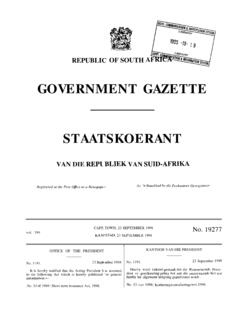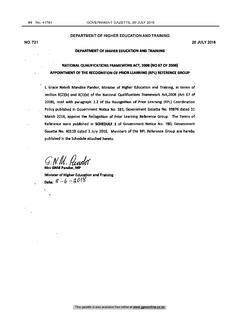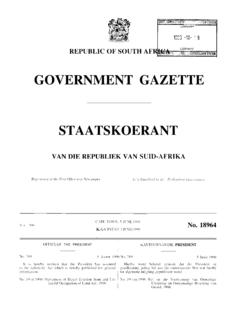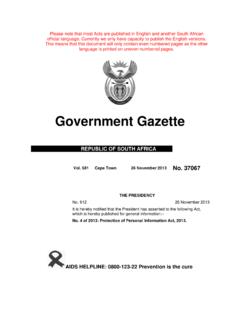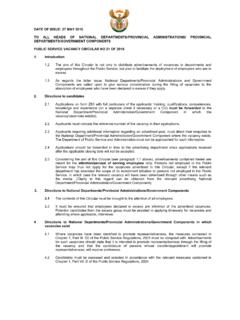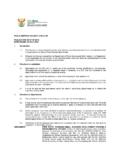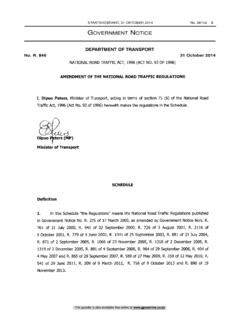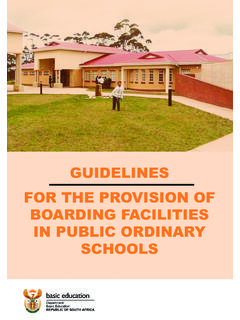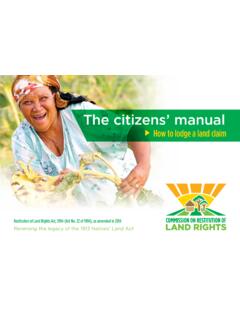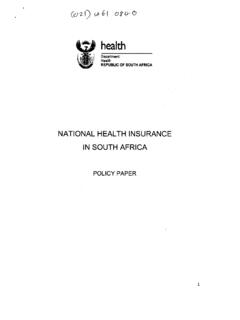Transcription of PROTOCOL ON CORPORATE GOVERNANCE
1 PROTOCOL ON CORPORATE GOVERNANCE in the PUBLIC SECTOR REPUBLIC OF SOUTH AFRICA Department of Public Enterprises. 2002 all rights reserved Page 1 of 54 PROTOCOL ON CORPORATE GOVERNANCE IN THE PUBLIC SECTOR 1. Historical Background In 1994 upon the election of a democratic majority government, the Government found that some of the instruments for delivering necessary services and carrying out policy were actually SOEs, and their control and GOVERNANCE was not based on any standardized principles or rules. These SOEs were organized in many different ways and subordinate to a wide range of legislation and statutory regulations. Some SOEs, in fact, acted as autonomous entities , having not had substantive direction or control from the previous Government for a long period of time. South African SOEs form a significant portion of vital industries that drive the economy by providing factor inputs. Three key inputs, electricity, transportation and telecommunications are dominated by SOEs.
2 Without these key SOEs, the resources, tourism, information technology and manufacturing sectors inter alia could not function effectively. These sectors are principal drivers of the formal sector economy, and provide for the bulk of economic growth. The status of South Africa's SOEs and the extent of potential privatization has been the subject of lively debate within Government and civil society since the first democratic elections. Given the special role of the SOEs, the need to sustain formal sector employment levels and skills retention and the debate on the ownership of key Economic assets, a path of restructuring was adopted. Essentially, this policy recognised the need to inculcate efficiency within the SOEs while concurrently ensuring that social and infrastructural goals were met. REPUBLIC OF SOUTH AFRICA Department of Public Enterprises. 2002 all rights reserved Page 2 of 54 In this context, the proper GOVERNANCE and control of SOEs became an important component of the restructuring process.
3 The magnitude of this task cannot be overestimated, given the aggregate size of SOEs and their contribution to GDP. These SOEs are the principal entities that deliver many social goods and services to ensure quality of life of all South Africans. The publication of the King Report first in November 1994 and secondly in March 2002 has given further impetus to the issues of GOVERNANCE not only in SOEs, but also in the full range of business entities . In 1999, the Government affirmed the overall strategic vision of the restructuring of SOEs. The Department of Public Enterprises was given an expanded mandate to lead the programme of restructuring with the active participation of the Cabinet. CORPORATE GOVERNANCE , as embodied in the new and revised PROTOCOL , is one of the cornerstones of this strategic vision. It is the Government s intent that the principles of this PROTOCOL should apply to all public entities and their subsidiaries.
4 2. CORPORATE GOVERNANCE , Legal and Policy Framework CORPORATE GOVERNANCE embodies processes and systems by which CORPORATE enterprises are directed, controlled and held to account. CORPORATE GOVERNANCE in South Africa was institutionalised by the publication of the King Report on CORPORATE GOVERNANCE in November 1994, which report has subsequently been superceded by the King Code of 2002. The purpose of the King Report is to promote the highest standards of CORPORATE GOVERNANCE in South Africa. The Code of CORPORATE Practices and Conduct contained in the King Report applies inter alia, to SOEs and agencies that fall under the PFMA. The PROTOCOL was first published in 1997 with a view to inculcating the principles of good GOVERNANCE in the SOE s and this PROTOCOL constitutes a substantial revision thereof in light of the King Code and international developments. The principles enunciated herein are specifically intended to apply only to the entities REPUBLIC OF SOUTH AFRICA Department of Public Enterprises.
5 2002 all rights reserved Page 3 of 54 listed in paragraph below. Accordingly, unlike the King Code, which covers a wide spectrum of entities in both the private and public sectors, the PROTOCOL seeks to provide guidance specifically to the public sector, taking into account the unique mandate of the SOE s, which includes the achievement of socio-politico-economic objectives of the Government. It is recognized further that since the King Code is of general application, there are various specific public sector related issues, which may not be fully addressed therein and which issues require to be addressed in the PROTOCOL . It should, therefore, be understood at all times that the principles of the PROTOCOL only seek to amplify and not supersede (or conflict with) those contained in the King Code and that the PROTOCOL should, in fact, be read in conjunction with the King Code.
6 The Government, as a major shareholder in SOEs, faces a wide range of risks associated with the operations of SOEs, including financial, reputation, political and operational risks. It is the responsibility of each Executive Authority (in whom the primary responsibility for appropriate SOE oversight and accountability to Parliament rests) to ensure that these risks are identified, reduced and managed. In this regard, a key requirement of SOEs is to report and account for their performance to the relevant Executive Authority in respect of financial and non-financial matters, at the same time, however, maintaining independence in the conduct of their duties and free from day to day involvement by the Executive Authority. In order to ensure that there are no actual or perceived conflicts of interest and that SOEs achieve the Government's broad policy objectives and ensuring that the SOE's boards operate efficiently and effectively, the Government would like to spell out its intentions and envisaged relationship with SOEs in this PROTOCOL , Shareholder Compacts and Policy Framework for SOE released by the relevant Executive Authorities from time to time.
7 SOEs operate within the framework of a variety of legislation including, inter alia, PFMA (which is part of Government s broader strategy to improve financial REPUBLIC OF SOUTH AFRICA Department of Public Enterprises. 2002 all rights reserved Page 4 of 54 management in the public sector), Companies Act 61 of 1973, as amended and the relevant legislation under which an SOE operates. It is, therefore, important that directors of SOEs develop working knowledge of this framework and ensure that the SOEs comply with their legal obligations. 3. Glossary of Terms and Interpretation In this PROTOCOL , unless the context otherwise indicates: - "Accounting Authority" means a body or person mentioned in section 49 of the PFMA; board" means the board of directors of the SOEs as constituted from time to time; "Executive Authority" means the Cabinet member who is accountable to Parliament for the SOE or in whose portfolio it falls and/or the member of the provincial Executive Council who is accountable to the provincial legislature for the SOE or in whose portfolio it falls; "GAAP" means South African Statement of Generally Accepted Accounting Practice as approved by the Accounting Practice Board or such other body authorised in terms of the relevant legislation to issue such accounting standards; Government" means the Government of the Republic of South Africa as defined in the Constitution of the Republic of South Africa.
8 JSE" Securities Exchange SA" means the Johannesburg Stock exchange; REPUBLIC OF SOUTH AFRICA Department of Public Enterprises. 2002 all rights reserved Page 5 of 54 "King Code" means The Code of CORPORATE Practices and Conduct representing the principles of good GOVERNANCE as set out in the King Report 2 of 2002, which report supercedes the King Report of 1994; independent non-executive director means a non-executive director who: has not been employed by the SOE in any executive capacity for the preceding three financial years; is, in relation to the SOE, not a significant supplier or customer, has no significant contractual relationship and is not a professional advisor, other than in his capacity as a director. "PFMA" means the Public Finance Management Act of 1999, as amended; the PROTOCOL means the PROTOCOL on CORPORATE GOVERNANCE in the public sector as more fully set out herein; shareholder" means the Executive Authority; shareholder compact means an agreement regulating the relationship between the Shareholder and the board; "SOE s" means State Owned Enterprises; REPUBLIC OF SOUTH AFRICA Department of Public Enterprises.
9 2002 all rights reserved Page 6 of 54 "Treasury" means the National Treasury established in terms of by section 5 of the PFMA or the provincial treasury, as may be appropriate in the circumstances; 4. Overview of GOVERNANCE Issues The Government s relationship to its SOE s is similar to the relationship between a holding company and its subsidiaries, features of which include: a strong interest in the financial performance of the SOE; reporting and accountability arrangements that facilitate an appropriate oversight by the shareholder; and remedial action by the shareholder where the SOE s strategic direction deviates from that preferred by the shareholder. The relevant Executive Authorities as contemplated in the PFMA, and the Minister of Finance represent the Government's ownership interest in the SOEs. The guiding principles of the PROTOCOL are as follows: Executive Authority should exercise strategic control over the SOE s consistent with their accountability to Parliament and the public; Executive Authority should set clear objectives for SOE s; REPUBLIC OF SOUTH AFRICA Department of Public Enterprises.
10 2002 all rights reserved Page 7 of 54 any Social Service Obligations that a SOE is to undertake should generally be specified through a Shareholder compact; the directors of a SOE should ensure the development of business strategies, policies and procedures and monitor management in the implementation thereof; the directors of a SOE should ensure that:- the SOE s activities are conducted so as to minimise any divergence of interests between the SOE and the shareholder; SOE s are managed in the best interests of the SOE s, shareholder and other stakeholders; and SOE s and their officers maintain the highest standards of integrity, accountability and responsibility; as recommended by the King Code, the board has a charter setting out its responsibilities, which should be disclosed in its annual report. At a minimum, the charter should confirm the board s responsibility for the adoption of strategic plans, monitoring of operational performance and management, determination of policy and processes to ensure the integrity of the SOE s risk management and internal controls, communication policy, and director selection, orientation and evaluation; REPUBLIC OF SOUTH AFRICA Department of Public Enterprises.
